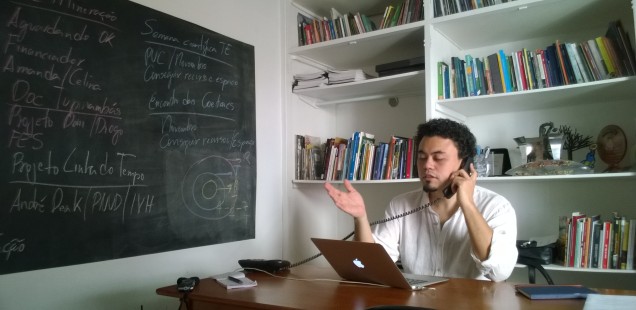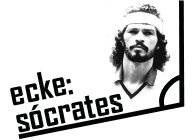
Information for Superheroes
Leonardo Sakamoto is obsessed. Apparently half asleep, he is sitting at his impeccably tidy wooden desk, an ultra-thin MacBook right in front of him. But the appearance is deceptive. The man is wide awake and perfectly capable of holding an improvised monologue in which he effortlessly includes the social crisis in Brazil, the World Cup, the upcoming elections and the future of journalism. If he doesn‘t get interrupted.
(São Paulo)
Sakamoto, 37, is a co-founder and the current president of Repórter Brasil, a scientific and journalistic think tank based in São Paulo. The son of a Japanese father and a Brazilian mother also works as a blogger and as a professor of journalism and is considered to be among the intellectual thought leaders of a new, more democratic Brazil.
ecke: Mr. Sakamoto, the world cup has started and already on the opening day there have been protests in several cities, similar to those during the Confederations Cup last year. Is history repeating itself?
Leonardo Sakamoto: No, I don’t think so, at least not the extent of the previous year. But I expected this. In the end, it is about football. And this time it is the World Cup, not a preparation tournament. The people of Brazil love football, including many of those who set the tone in the protests. That is why demonstrations may just as well be interrupted for an important game.
ecke: Slogans like »Nao vai ter Copa« (»There will be no World Cup«) suggest otherwise.
Sakamoto: That is the huge misunderstanding. Many still do not comprehend that the protests are directed against the priorities of the government and not against football itself. We Brazilians would prefer to make a distinction between football and politics. But it is simply not possible: football is politics.
ecke: Why is it difficult for many people to understand what the protests are about in particular?
Sakamoto: That is, among other reasons, connected to the confusingly complex structure of stakeholder groups among the government’s opponents. One example: Most of the Brazilians in the stadium are rich people. The stadiums were built for them. And rich people dislike Dilma (Rousseff) and her Labour Party. For that reason, they went out onto the streets during last summer as well. The anger of the demonstrators who suffered from police violence in the district Tatuapé a few days ago is naturally directed against the government, too. And at the same time, simply put, the rich Brazilians in the stadium are against the poor Brazilians on the streets. The destitute population claims more rights and the rich do not want to grant them these rights. Both went out onto the streets last year, for the same but simultaneously different reasons.
ecke: So some of last year’s protesters ceased to participate?
Sakamoto: Exactly. Namely the upper class and parts of the middle class, too. The latter decide from an economical point of view: If one is able to buy electronic things, if the children can go to proper schools, if one can go on a vacation once per year, then one will not go out onto the streets during the WC. But despite the reduced extent of protests, here is a reason for hope: it is the young people who are the driving force. They are not satisfied with the current democracy and they are looking for a new way. They want a more direct democracy and less state power, less corruption.
ecke: Is Brazil’s performance in the World Cup going to influence this year’s election?
Sakamoto: I don’t think so. This cannot be viewed in black-and-white, based on the motto: If Brazil wins the World Cup, Dilma is right and all costs are justified, and if not, all is bad. Apart from that, the more recent past does not show a positive correlation between World Cup title and reelection. On the contrary. In 1994 the government was voted out of office after the victory, whereas the new one stayed in office after the elimination in 1998. In 2002, we became World Champion again but there was a change of government. For the first time a president from the Labour Party, Lula, was elected. In the years 2006 and 2010, after an early elimination, the Labour Party stayed in power nonetheless. In my opinion, the 2014 elections will be won by the party that gets a grip on the huge subject of security.
ecke: Do you see additional positive sides of the WC besides the entertainment value of football?
Sakamoto: Yes and I see these for instance in São Paulo. Here there are many poor people, not only Brazilians, but from other, poorer South American countries as well and many wealthy people who are here for business and who cannot be seen because they move by car or helicopter. In contrast to Rio de Janeiro there normally are very few tourists. Through the WC these structures are somewhat broken up. The poorer classes earn on the tourists, the businessmen can occasionally be seen on the streets. The middle class from around Avenida Paulista or in Vila Madalena is slowly coming out of its shell. The World Cup is a good opportunity for them to interact with the tourists, for example, and to have a good time. And once more: the WC has already helped us to make immense societal progress with regard to one issue: since the redemocratization in 1985 this is the first time that things are changing. It will be more difficult for politicians, the media and companies to hide something after the World Cup. People are creating networks now, are finding new ways to communicate. They demand more. They raise their expectations. And that is a good thing.
ecke: What is your personal opinion about the WC in Brazil?
Sakamoto: I have mixed feelings. The newly built airports and roads are a benefit for the country in the long run. Some of the stadiums are definitely not. In addition, the Fifa has introduced so many restrictions I cannot understand. We have to take action against that, we have to change it. In contrast to Russia and Qatar, however, Brazil is a democratic country that does not simply let the Fifa overrun itself.
During the conversation Sakamoto constantly leers at his laptop, scans the information and then continues to speak. Already in the early morning it is obvious that there is a strong competition for his attention from various sides. Sakamoto is a man in demand. Tens of thousands of people are reading his daily blog, he has roughly 35,000 followers on twitter.
ecke: What are you and your colleagues exactly doing at Repórter Brasil?
Sakamoto: Repórter Brasil is an NGO, which has set itself the mission to identify and criticize the human rights violations in Brazil. We want to change the way social, economic and political leaders are currently thinking. We are defending Human Rights by reporting about modern slavery, human trafficking, child labour and the discrimination against indigenous minorities. Most recently, we also have increasingly dealt with the topic of environment protection.
ecke: How is Reporter Brasil achieving these ambitious goals?
Sakamoto: We are constantly collecting, analyzing and spreading information. You could divide our organization in four branches: The first consists of an educational program, in which we provide information material and organize workshops about topics such as Human Rights or environment protection to local leaders and teachers in over 120 cities. The second branch is a news agency, which is associated with a production company specialized in more comprehensive documentaries. Further our third branch consists of a research institute, which compiles and publicizes various studies in collaboration with scientists from universities, journalists and other NGOs. Last but not least, we have an advisory role, as we are represented in many local bodies and maintain valuable relationships to e.g. the ministry of education. We managed to become Brazil’s most reliable source in our areas of expertise. Journalists from all different news agencies and media corporations refer to us on a regular basis. Our resource is the information, whether it is of academic or journalistic nature.
ecke: Which concrete projects have you running in the course of the World Cup?
Sakamoto: Inexcusable things happened in some cities during the construction of the stadiums. We have been reporting about these misdoings until today. By the time we were approaching the opening match, the people in charge tried to accelerate the construction of the stadium by all means. Many employees have severely suffered from these working conditions, as the human body is not a machine. Moreover, there was an incident of modern slavery in Sao Paulo. The building company OAS employed around 100 people to build Terminal 3 at the international airport Guarulhos who were forced to work under degrading conditions. The ministry of labour only took action and ‘freed’ the employees after we had published an article about this scandal. Recently we have published a study, which is concerned with the organization of mega sports events such as the World Cup or the Olympic games in 2016 and deals with the risks involved for the respective societies.
Leonardo Sakamoto’s phone does not stop ringing. He is not always answering it, but if he does, he does it with closed eyes while using expressive gestures. »Leo, what is going on, answer!«, someone writes on his messanger.
ecke: You are working with young and ambitious journalists who want to initiate change like the Midia Ninjas. Simultaneously, however, you also cooperate with the traditional and well-established media corporations. How is this compatible?
Sakamoto: As mentioned before, we respect the work of all different journalistic streams. Obviously we maintain a rather leftist approach, but also the more conservative journalists use our information. We are not holding back our information to anyone, as we want to ensure complete transparency. The pictures, too, everyone can use. My founding partners and I, we know how the media sector works. We were educated together with the colleagues from the more traditional media corporations in the school of journalism. We disagree most of the time, but we are still friends.
ecke: How do you see the future of journalism in Brazil?
Sakamoto: The journalism is currently stranding at a crossroad. Similarly to other countries, the traditional media corporations are being challenge by the population. Many people without a professional background in journalism also want to analyze now and make sense of the complexity of things. Journalists who fail to adapt to this new era will disappear.
ecke: You were one of the founders of Repórter Brasil in 2001. What was your motivation to get involved?
Sakamoto (grins) Of course we wanted to change the world. Many journalists think they are the Clark Kents and that they are able to change the world with their own hands. This, however, is not working. We at Repórter Brasil want to change the world by providing the true superheroes with information. They are all out there, fighting against the system and social inequality. But to do this effectively, they need information, which they get from us. This group includes politicians, social leaders and corporations. They are initiating the change, which Brazil is in desperate need of.
ecke: One last question: You are working at Repórter Brasil full-time, are teaching journalism at the university and are publishing a new blog entry everyday. When are you exactly sleeping?
Sakamoto: Don’t worry, I do sleep – sometimes at least.
Translation: Heinrich Zozmann and Jasper Schlump

